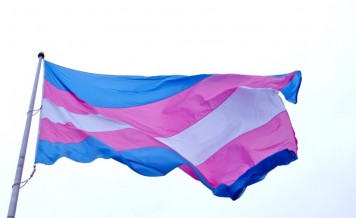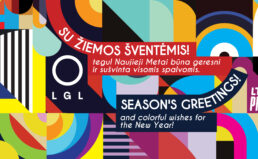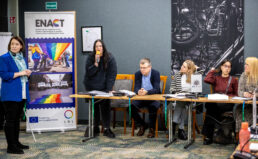If dating takes a leap into the unknown for everybody, the process surely raises some extra dilemmas for transwomen. Especially in Lithuania, the most backward country in the European Union as far as protection of transgender rights are concerned. Transgender people represent the most vulnerable group within the LGBT* spectrum and the most at risk of discrimination and hate crimes.
Since the national law on gender reassignment procedure and on legal recognition of transgender persons is not harmonized yet with the European standards of transgender people’s human rights, transgender persons are simply erased by the Lithuanian system. Plus, having your identity displayed can be difficult in a system that exclusively recognizes personal names in relation to the gender assigned at birth. Surely nicknames can help in the short term but, in the long one, your identification card becomes a skeleton in the closet hard to get rid of.
By being confined in this legal and physical limbo, transgender persons are invisible in the society. According to a research conducted by the Eurobarometer, on perceptions of discrimination in the EU, among other worrisome facts about the situation of LGBT* people in Lithuania, only 3% Lithuanians report having a transgender friend or acquaintance in their life – quite insightful data that says much on the poor and almost non-existent visibility of transgender persons. As a consequence, Lithuanian society itself is also particularly unaware of transgender persons’ issues and this fear of the unknown feeds feelings of rejection, non-acceptance, disgust and amorality towards transgender people. These results are particularly evident in the field of “dating” and when the protagonists of this arena are transwomen.
In a society that is still established on patriarchal dogmas, conducting a safe romantic and sexual life becomes even more challenging for transwomen. Taking a closer look to the problem, two main reasons can be mentioned to explain the difficulties that transwomen face in dating. The first concerns the choice of whether coming out as a transgender while dating, thus being more exposed to the risk of verbal and physical abuse.
The second reason has to do with modalities and instruments related to dating: on which means a transwomen can rely in order to plan and conduct a date? Maybe spontaneous face-to-face interaction? LGBT*-friendly places? Social networks, dating apps?
If we take into consideration the first option, not to be aware of the reaction of the other person to your transgender identity, is a high factor of risk and a discouraging reason to engage in a date. Focusing instead on the second aspect, finding numerous LGBT*-friendly places might be complicated in a reality such as the Lithuanian one. Hanging out in the capital-city Vilnius definitely helps, though it must be taken into consideration that very few are the LGBT*-friendly spots that the city accounts. Plus, transphobia is a concerning issue even within the so-called “safe” environment of the LGBT* community. If we consider instead the dating scenarios offered by social networks and meeting apps, the virtual barrier of “who-is-on-the-other-side-of-the-screen”, definitely plays a role in fostering feeling of mistrust and insecurity.
It could be then concluded that for transwomen dating pool is often object of a double-standard. In the first scenario, transwomen might be accepted in the dating arena, but still running a high risk of being objectified, having their identity very much sexualized and often being secluded to a secret dimension, not worth enough to be visible in daylight. In the second case, transwomen might encounter open rejection and hostility, thus potentially facing very dangerous situation, and perhaps risking their own life. This creates a vicious circle: because of the above mentioned reasons, the majority of transwomen within Lithuanian society seems very reluctant to engage in the dating arena.
I interview today Lisa on the issue of dating violence and on the many complications that dating implies for transwomen. I met Lisa during one workshop that the National LGBT* Rights Organization LGL periodically organizes for the local LGBT*community. I casually met her again during SapfoFest, an independent community-initiated festival in the Baltic States, which seeks to empower and connect the queer community. When I asked her if she would have liked to be interviewed in the framework of the project “Bleeding Love”, she accepted with a big smile, without any shyness.
I: Lisa, would you like to introduce yourself?
L: My name is Lisa, I am [XX] years old and I was born in [City A], [Country B]. I have been studying [study stream] for four years now in Vilnius, Lithuania. I identify as either transfemale or genderqueer, but female when it comes about the male and female bipolar world. So it always depends on the situation and if the situation is very “traditional”, I prefer to identify as a female. I feel more comfortable this way and I prefer feminine pronouns, but sometimes I just don‘t care too much about this and genderqueer is perfectly fine with me. I‘m mostly attracted to men and masculinity, but in some cases I feel attracted to people who identify as girls or feel female. However, since I feel mostly attracted by men, I guess I can consider myself heterosexual in most of the cases.. And yeah, I‘m kinda out because there is much need of being out for LGBTQ people in our society: because a lot of problems and misunderstandings happen since people never meet anyone like that and because a lot of LGBTQ people tend to be silent and do not wish to be visible I think.
I: In your opinion, is threat or verbal abuse a form of dating violence?
L: Yes, verbal abuse, is definitely a form of violence. Verbal abuse, physical abuse, mental abuse and also any form of violent attitude are forms of dating violence. I think this often happens when a person thinks to be better of someone else because of different reasons such as social class, gender, sexuality and so on…Thus, because of some forms of inequality. To give an example, at my university there was a lady who was in one of our courses of communication and she called my parents (I am an adult!) and told them “your child came to University as a girl“. So, it was not a case physical violence or verbal abuse to my side but I personally think it was a very, very, very much violent initiative and invasion of privacy.
I: Who are in your opinion perpetrators of violence?
L: Perpetrators are those who make this dating violence, who are responsible for it: who follow the stupid logic of “you wear a dress and make up yourself, so you wanna be raped“.
I: Do you have any idea why does this violence happen when dates involve transgender women?
L: I think it is basically because of people‘s lack of education and reflection on the self. I personally believe that a person who has no problem with accepting their identity, their sexual orientation and gender, would not be violent to anyone who similarly accepts these. However, if a person is violent, is definitely because he or she has a problem: they might let you think that you have the problem, while instead the problem is their own one and how do they perceive themselves. I think these people are afraid. Let‘s say, for example, they think to be heterosexual and they are dating or seeing a woman and feel attracted to her. Then they realize that this woman used to be a man and they immediately react saying things such as “You know, I am not gay!”. Because gay in their consciousness is something really, really negative, […] as if they would become sick or something like that by dating a person who used to be a man. They are also afraid, of course, of their friends, their family, by the fact of not being understood from the other side, from people. So it is all about “if people knew” and […] “it has to stay between us”. This is also what happens to me really often. Recently, I have been dating a guy for a while and we did spend some nights together. But then he kept always saying that it had to stay between us and bla, bla, bla… He is really attracted to me and I don‘t know how to behave with him. We study at the same university but in different courses. But he is still not ready in some cases to even talk to me at university. When we did spend our time together he kept saying “I hope you understand that this has to stay between us”. It‘s just a little bit (actually not a little bit), kind of offensive to me. First of all, because I have no reason to shout anything about my relationship to people, and secondly, even if I shouted about it – what‘s the problem?
I: Do you think that victims of dating violence report the abuse to police?
L: I think in many cases abuse is not reported because, of course, they might be more concerned about their life and they are aware that police itself is not sometimes able to protect transwomen. I know cases where actually policemen raped transwomen.
I: Did it happen in [Country A]?
L: No, no, it was a case in [City B], [Country B]. I knew a girl who told me she was an escort and prostituting herself and when she reported an abuse she faced to a policeman, the policeman just raped her. It happened in [Country B], let‘s say a kind of open-minded country. And just because of this case and many others, I then understand why so many suicides and murders happen. I‘m still alive but, as I told you, I‘m trying to be… cautious with my life and not go to places where I do not feel safe. That is why I do not socialize that much. I spend most of my time in my one room flat. And I feel pretty good, I enjoy food, I enjoy studying, I enjoy sleeping, I enjoy sometimes being out with some friends… But I do understand that if I get to know a guy in some place, I might be in a situation where there is no way to escape: because even if a guy is attracted to me I know that in most of the cases, I could not open up and it would not be ok if I say “I am trans”. Firstly, because he thinks I am a cisgender female. And then we could talk and even if it would be everything alright, if he would tell me a lot of compliments and if we would hug and kiss, I always think “But in the end?”. [In the moment of revelation], It might end up with verbal abuse, or with all the friends of him pointing at me and he could tell it to other people! So, I tend to change and go to another place and… But, it‘s always like that, if I go to a place, I might risk to end up in this situation which I don‘t feel like I wanna end up with. I know the night it is supposed to be fun, but I do understand that in many cases you can end up being beaten up, and end up being murdered. It‘s not safe.. It‘s always you the one who risks. Outside of your house… you always risk.
I: Does this fear then preclude you even from trying to date?
L: In many cases it does. Because you can try, and try again, and even find the forces but it depends… For example, I‘m now in a very good mood. But most of my moods are -not most but at least half of them- are very sad. So, when I am in a good mood, I‘m able to think rationally, socialize, talk to people and be open. But then I face some kind of violence or start to think that I find these things very disgusting to me and then this always stops me from trying. You get sad and then next time you don‘t even want to try. If these episodes would have happened even more often, I wouldn’t be able to even be here [at SapfoFest] right now. I accept myself. Yes. I‘m able to smile, I‘m able to talk to people. But then… When you always face a kind of hatred or no understanding you don‘t wanna try, you don‘t wanna do anything, you don‘t wanna meet people because it‘s like always going through the same thing, you‘re trying to explain something and they are instead stuck in their understanding and in their reality… And being so much… “passport-oriented“. It seems that once you were born something, you were born this way and there is no possibility of change. Plus, people always ask you all these questions such as “Where do you come from?“… What does it mean, where do I come from? What does it mean in our world, in the globalized and so socialized world we live in? In the age of internet, where it is so easy to have access to information. But still, people will ask where you come from. So it‘s the same thing with gender. It is a relief when you don‘t really think about it. But we always do it, we live in this culture.
I: Do you think the state, in [Country A] and Lithuania, protects victims of dating violence?
L: It‘s hard to say. I don‘t know if I would myself report an abuse in case of violence. Probably, I wouldn‘t. Neither in [Country A] nor in Lithuania because then I fear I might be beaten up… So, no, I wouldn‘t. I would rather make a selfie and try to stay positive. But if I end up in a hospital the state should protect me. I think it should.
I: Why a selfie? To post it in some social networks?
L: No, it‘s just something I do in order to deal with traumas. I don‘t know if I would post it, I don‘t know. Maybe I would, in order to seek for some empathy or help. Or I would send it to some people. Anyway, in case of violence, I know [Country A] would not protect me. There was a case where a guy was beaten up because of homophobia. They shouted to him “Hey, you! faggot! You are gay!” and then they beated him up till he was almost dead. But the Court stated that this happened not because of some kind of hatred, not because of homophobia. It was just because of, I don‘t know, how do you call it… just some kind of… not really an attack but like when you do something wrong…
I: A provocation?
L: Maybe, something like that. I am not sure. About Lithuania, I do not know of any case but I think Lithuania‘s legal system is really bad too.
I: So, it occurred you dated some guys and then when you came out as transgender woman the reaction was really negative. How did you react like in that moment? How did you feel after?
L: Oh, in those cases, the guys just walked away or just said “What the fuck, why didn’t you tell me immediately about that? Why did you not try to send a message, like when we were not together?”. Some other guys instead seemed very curious. They were asking many curious questions. For instance, when I told I am a transgender person to a guy, he started to ask these very curious questions and was still very friendly. We talked and he was just commenting “Yeah, yeah, that‘s good”. Eventually, he just blocked me on every social network. Or in another case, I wrote that I am transgender in some dating app and I exchanged some messages with a guy who eventually turned up saying: “What the fuck, why didn’t you tell me that?”. I think ignorance plays a big part in that. Another guy was instead telling me: “Yeah, I‘m kinda attracted to you but it‘s weird and it‘s not okay. Now I understand that it is not a right thing to do, so, ok, goodbye”. All these episodes happened in Vilnius. How did I react then to that? It just made me understand again and again, that I don‘t know what is the right behavior to have in these cases. I do not know how should I act with a potential date. Because if I tell the other person [that I am a transgender woman] from the beginning it‘s just bad for me; the person won‘t probably be open-minded about that. If I tell that later it‘s equally dangerous, especially considering that I invested time with this person, I got to know this person and I already engaged myself in this dating process… I‘m a very touchy and sensitive person and I could be hurt. However, I understand that hatred is unfortunately a connection between us. It‘s really cool and pleasant if I can share something about me with a person but this can also crash me. I am definitely not a person that shares too much with strangers but if a person is kind and enters my personal space, I feel I need to be sincere with this person. However, I am aware this person can hurt me.
I: Do you think dating violence can be considered now as a very quite widespread issue inside the local LGBT* community?
L: Do you mean in Vilnius for example?
I: Yes.
L: Then yes, yes, yes, yes…yes! For example, when I identified myself as a gay boy, around three or maybe four years ago, there was a case where I met a guy. I met him from the internet and we just wanted to hang out. But then we hanged out and at one point he dragged me to a dark place and he basically raped me. He he had a knife, he threatened me… Is this common? Probably it is, it‘s difficult to say. I sometimes feel I‘m an alien in this world.
Despite the bitter content of her story, Lisa concludes the interview smiling. She is brave, she is a fighter. Once again, she stressed to me how important is to share experiences, how fundamental is, despite the fear, to obtain visibility for transgender persons. And to empower this group because, in Lithuania, it surely is the most vulnerable one in the LGBT* spectrum.
Interview was conducted in July 2015 by LGL’s EVS volunteer Alice Michelini, in the framework of SapfoFest, an independent-community based festival taking place in the district of Jonava, Lithuania. It has been published with consent and approval of the respondent for the purpose of Bleeding Love research project. Lisa has been chosen as a nickname to protect the respondent’s privacy.




